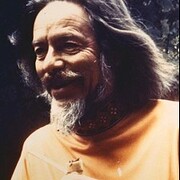Alan W. Watts (1915–1973)
Autor(a) de The Way of Zen
About the Author
Alan Watts (1915-1973) was a renowned lecturer and the author of nearly thirty books, including The Way of Zen and The Book. Born in Chislehurst, England, he moved to the United States in 1938 and began Zen training in New York. He received a master's degree in theology from Seabury-Western mostrar mais Theological Seminary and served as an Episcopal priest before leaving the ministry in 1950 to move to California, where he joined the faculty of the American Academy of Asian Studies (now the California Institute of Integral Studies). mostrar menos
Image credit: From 'Man in Nature'.
Obras de Alan W. Watts
The Spirit of Zen: A Way of Life, Work, and Art in the Far East (Wisdom of the East) (1958) 352 cópias
The Meaning of Happiness: The Quest for Freedom of the Spirit in Modern Psychology and the Wisdom of the East (1970) 169 cópias
The early writings of Alan Watts : essays by the leading interpreter of Zen to the West (1987) 8 cópias
Petrokiller 2 cópias
Udha zen 2 cópias
A Vida Contemplativa 2 cópias
Lao Tzu's Tao Te Ching 2 cópias
Het boek 2 cópias
From Time To Eternity: A Speech 2 cópias
Suyun Yolu Tao 1 exemplar(es)
Cloud-Hidden, Whereabouts Unknown-A Mountain Journal 1 exemplar(es)
EL ESPIRITU DEL ZEN 1 exemplar(es)
Zen-Buddhismus Tradition und lebendige Gegenwart 1 exemplar(es)
Alan Watts Lectures and Essays 1 exemplar(es)
The Meditation Experience: Volume III 1 exemplar(es)
L'esperienza della spiritualità - Mito e Religione 1 exemplar(es)
What to do With the Church 1 exemplar(es)
Ecological Awareness and Form That Matters MP3 Disk 1 exemplar(es)
Zen -buddismen 1 exemplar(es)
HI Isegreti del Tao 1 exemplar(es)
The Christian doctrine of marriage / 1 exemplar(es)
Theologia mystica 1 exemplar(es)
Ο δρόμος του Ζεν 1 exemplar(es)
Beat Zen, Square Zen & Zen (Original Mix) 1 exemplar(es)
What happens after Death? 1 exemplar(es)
Alan Watts Essential Lecture Collection, Eastern Wisdom Collection, Biographic Edition, and Essential Seminars. 82 CDs. (2000) 1 exemplar(es)
La Suprema Identidad. Una nueva y reveladora aproximación a la espiritualidad oriental. (1961) 1 exemplar(es)
Thiền Đạo 1 exemplar(es)
Zen: A Short Introduction with Illustrations by the Author 1 exemplar(es)
What God is Dead? 1 exemplar(es)
Images of Man 1 exemplar(es)
Buddhism: Man and Nature 1 exemplar(es)
The Mood of Zen 1 exemplar(es)
Zen and the Limits of Explanation 1 exemplar(es)
Why Not Now: Dhyana, The Art of Meditation 1 exemplar(es)
Birth, Death & the Unborn 1 1 exemplar(es)
The Scriptures of Mahayana Buddhism 1 exemplar(es)
The Unpreachable Religion 1 exemplar(es)
Philosophy of Nature 1 exemplar(es)
The Surprise of Mahayana Buddhism 1 exemplar(es)
Living Free 1 exemplar(es)
Sense of Nonsense & Coincidence of Opposites 1 exemplar(es)
Zen Buddhism A New Outline and Introduction 1 exemplar(es)
On Being God 1 exemplar(es)
Suspension of Judgment 1 exemplar(es)
The Joker 1 exemplar(es)
Mahayana Buddhism 1 exemplar(es)
Two Kinds of DIscipline 1 exemplar(es)
Death and Rebirth 1 exemplar(es)
psicoterapia del Este psicoterapia del Oeste 1 exemplar(es)
o homem;a mulher e a natureza 1 exemplar(es)
On Being God 1 exemplar(es)
The Wisdom of Insecutiry 1 exemplar(es)
Associated Works
Lord of the Four Quarters: The Mythology of Kingship (Jung and Spirituality Series) (1966) — Prefácio, algumas edições — 64 cópias
World Religions Volume 3 : Meditation, Prayer and Trance [video recording] (2006) — Featured — 2 cópias
World Religions Volume 4 : Zen Meditations with Alan Watts [video recording] (2006) — Featured — 2 cópias
Etiquetado
Conhecimento Comum
- Nome padrão
- Watts, Alan W.
- Nome de batismo
- Watts, Alan Wilson
- Data de nascimento
- 1915-01-06
- Data de falecimento
- 1973-11-16
- Local de enterro
- Cremated with ashes buried half at Druid Heights, Marin County, California, USA and half at Green Gulch Monastery. Muir Beach, California, USA
- Sexo
- male
- Nacionalidade
- UK
- Local de nascimento
- Chislehurst, Kent, England, UK
- Local de falecimento
- Druid Heights, Marin County, California, USA
- Locais de residência
- New York, New York, USA
Sausalito, California, USA
London, England, UK - Educação
- Seabury-Western Theological Seminary (M.Th.)
The King's School, Canterbury - Ocupação
- philosopher
writer
speaker
priest
philosophical entertainer - Organizações
- American Academy of Asian Studies
KPFA - Pequena biografia
- A prolific author and speaker, Alan Watts was one of the first to interpret Eastern wisdom for a Western audience. Born outside London in 1915, he discovered the nearby Buddhist Lodge at a young age. After moving to the United States in 1938, Alan became an Episcopal priest for a time, and then relocated to Millbrook, New York, where he wrote his pivotal book The Wisdom of Insecurity: A Message for an Age of Anxiety. In 1951 he moved to San Francisco where he began teaching Buddhist studies, and in 1956 began his popular radio show, “Way Beyond the West.” By the early sixties, Alan's radio talks aired nationally and the counterculture movement adopted him as a spiritual spokesperson. He wrote and traveled regularly until his passing in 1973.
Membros
Resenhas
Listas
You May Also Like
Associated Authors
Estatísticas
- Obras
- 193
- Also by
- 10
- Membros
- 14,745
- Popularidade
- #1,562
- Avaliação
- 4.0
- Resenhas
- 166
- ISBNs
- 484
- Idiomas
- 16
- Favorito
- 52
















Alan Wilson Watts was a British philosopher, writer and speaker, who held both a Master's in Theology and a Doctorate of Divinity. Famous for his research on comparative religion, he was best known as an interpreter and popularizer of Asian philosophies for a Western audience. He wrote over 25 books and numerous articles on subjects such as personal identity, the true nature of reality, higher consciousness, the meaning of life, concepts and images of God and the non-material pursuit of happiness. In his books he relates his experience to scientific knowledge and to the teachings of Eastern and Western religion and philosophy.… (mais)